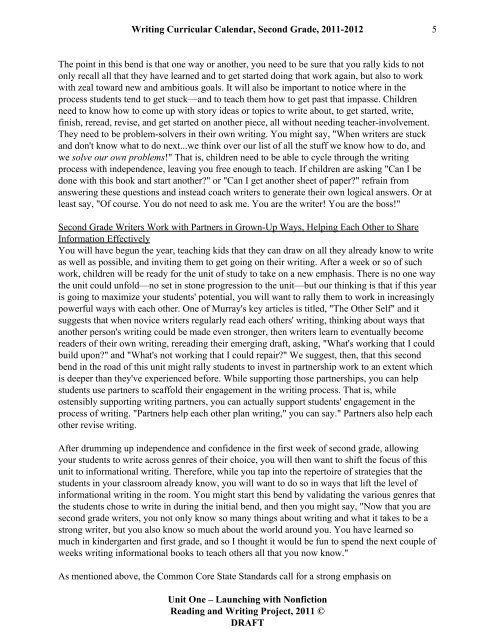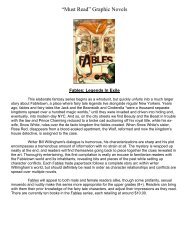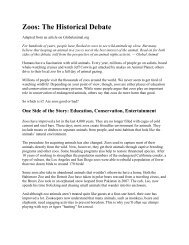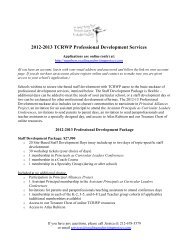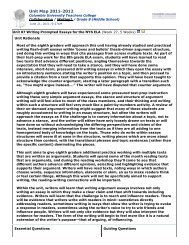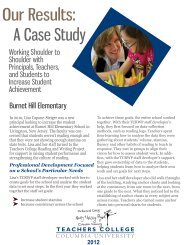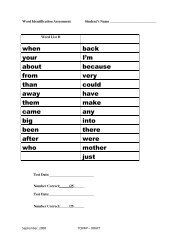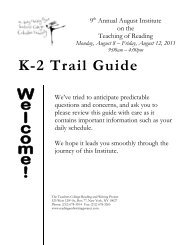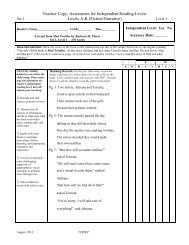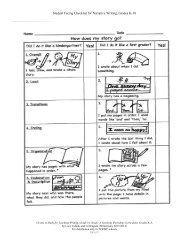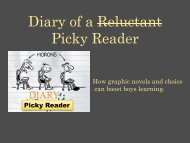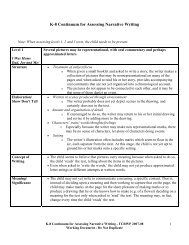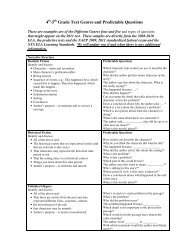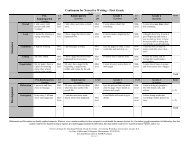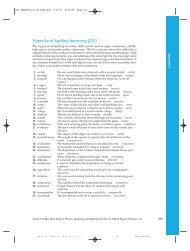2nd Grade Writing Unit 01 Launching with Nonfiction - The Reading ...
2nd Grade Writing Unit 01 Launching with Nonfiction - The Reading ...
2nd Grade Writing Unit 01 Launching with Nonfiction - The Reading ...
Create successful ePaper yourself
Turn your PDF publications into a flip-book with our unique Google optimized e-Paper software.
<strong>Writing</strong> Curricular Calendar, Second <strong>Grade</strong>, 2<strong>01</strong>1-2<strong>01</strong>2 5<strong>The</strong> point in this bend is that one way or another, you need to be sure that you rally kids to notonly recall all that they have learned and to get started doing that work again, but also to work<strong>with</strong> zeal toward new and ambitious goals. It will also be important to notice where in theprocess students tend to get stuck—and to teach them how to get past that impasse. Childrenneed to know how to come up <strong>with</strong> story ideas or topics to write about, to get started, write,finish, reread, revise, and get started on another piece, all <strong>with</strong>out needing teacher-involvement.<strong>The</strong>y need to be problem-solvers in their own writing. You might say, "When writers are stuckand don't know what to do next...we think over our list of all the stuff we know how to do, andwe solve our own problems!" That is, children need to be able to cycle through the writingprocess <strong>with</strong> independence, leaving you free enough to teach. If children are asking "Can I bedone <strong>with</strong> this book and start another?" or "Can I get another sheet of paper?" refrain fromanswering these questions and instead coach writers to generate their own logical answers. Or atleast say, "Of course. You do not need to ask me. You are the writer! You are the boss!"Second <strong>Grade</strong> Writers Work <strong>with</strong> Partners in Grown-Up Ways, Helping Each Other to ShareInformation EffectivelyYou will have begun the year, teaching kids that they can draw on all they already know to writeas well as possible, and inviting them to get going on their writing. After a week or so of suchwork, children will be ready for the unit of study to take on a new emphasis. <strong>The</strong>re is no one waythe unit could unfold—no set in stone progression to the unit—but our thinking is that if this yearis going to maximize your students' potential, you will want to rally them to work in increasinglypowerful ways <strong>with</strong> each other. One of Murray's key articles is titled, "<strong>The</strong> Other Self" and itsuggests that when novice writers regularly read each others' writing, thinking about ways thatanother person's writing could be made even stronger, then writers learn to eventually becomereaders of their own writing, rereading their emerging draft, asking, "What's working that I couldbuild upon?" and "What's not working that I could repair?" We suggest, then, that this secondbend in the road of this unit might rally students to invest in partnership work to an extent whichis deeper than they've experienced before. While supporting those partnerships, you can helpstudents use partners to scaffold their engagement in the writing process. That is, whileostensibly supporting writing partners, you can actually support students' engagement in theprocess of writing. "Partners help each other plan writing," you can say." Partners also help eachother revise writing.After drumming up independence and confidence in the first week of second grade, allowingyour students to write across genres of their choice, you will then want to shift the focus of thisunit to informational writing. <strong>The</strong>refore, while you tap into the repertoire of strategies that thestudents in your classroom already know, you will want to do so in ways that lift the level ofinformational writing in the room. You might start this bend by validating the various genres thatthe students chose to write in during the initial bend, and then you might say, "Now that you aresecond grade writers, you not only know so many things about writing and what it takes to be astrong writer, but you also know so much about the world around you. You have learned somuch in kindergarten and first grade, and so I thought it would be fun to spend the next couple ofweeks writing informational books to teach others all that you now know."As mentioned above, the Common Core State Standards call for a strong emphasis on<strong>Unit</strong> One – <strong>Launching</strong> <strong>with</strong> <strong>Nonfiction</strong><strong>Reading</strong> and <strong>Writing</strong> Project, 2<strong>01</strong>1 ©DRAFT


